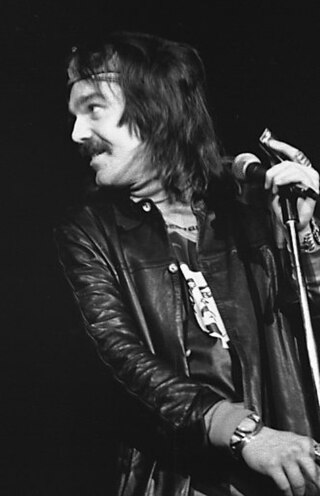
Don Van Vliet was an American singer, songwriter, multi-instrumentalist, and visual artist best known by the stage name Captain Beefheart. Conducting a rotating ensemble known as the Magic Band, he recorded 13 studio albums between 1967 and 1982. His music blended elements of blues, free jazz, rock, and avant-garde composition with idiosyncratic rhythms, absurdist wordplay, a gravelly voice, and a wide vocal range. Known for his enigmatic persona, Beefheart frequently constructed myths about his life and was known to exercise an almost dictatorial control over his supporting musicians. Although he achieved little commercial success, he sustained a cult following as an influence on an array of experimental rock and punk-era artists.
The Blue Ox Babes were an English pop group, formed in early 1981 by the former Dexys Midnight Runners guitarist Kevin 'Al' Archer, together with his girlfriend Yasmin Saleh, guitarist Nick Bache and former Dexys keyboard player Andy Leek. Archer was keen to mix the soul sounds of his previous group with folk styles. To this end he recruited fiddle player Helen O'Hara to play on demo tapes of the new songs he had written. When former colleague Kevin Rowland heard these demo tapes, he invited O'Hara to join Dexys, and adopted a similarly folk-influenced sound for his own group.

Rocks is the fourth studio album by American rock band Aerosmith, released on 3 May 1976. AllMusic described Rocks as having "captured Aerosmith at their most raw and rocking." Rocks was ranked number 366 on the updated Rolling Stone's list of the 500 Greatest Albums of All Time in 2020. It has influenced many hard rock and heavy metal artists, including Guns N' Roses, Metallica, and Nirvana. The album was a commercial success, charting three singles on the Billboard Hot 100, two of which reached the Top 40. The album was one of the first to ship platinum when it was released, and has since gone quadruple platinum.
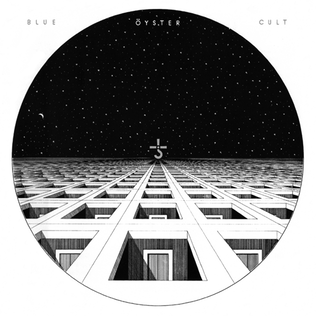
Blue Öyster Cult is the debut studio album by the American rock band Blue Öyster Cult, released in January 1972 by Columbia Records. The album featured songs such as "Cities on Flame with Rock and Roll", "Stairway to the Stars", and "Then Came the Last Days of May", all of which the band still plays regularly during its concerts. Despite positive reviews, the album failed to chart for some time before finally cracking the Billboard 200 chart on May 20, 1972, peaking at No. 172. Blue Öyster Cult toured with artists such as The Byrds, Alice Cooper and the Mahavishnu Orchestra to support the album.
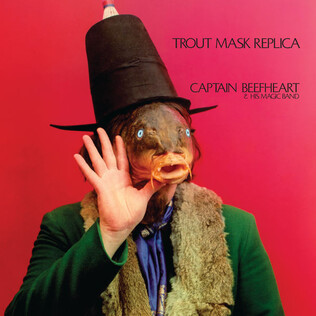
Trout Mask Replica is the third studio album by the American band Captain Beefheart and his Magic Band, released as a double album on June 16, 1969, by Straight Records. The music was composed by Captain Beefheart and arranged by drummer John "Drumbo" French. Combining elements of R&B, garage rock, and blues with free jazz and avant-garde composition, the album is regarded as an important work of experimental rock. Its unconventional musical style, which includes polyrhythm, multi-octave vocals, and polytonality, has given the album a reputation as one of the most challenging recordings in the 20th century musical canon.

Get Your Wings is the second studio album by American rock band Aerosmith, released on March 15, 1974. The album was their first to be produced by Jack Douglas, who also was responsible for the band's next three albums. Three singles were released from the album, but none reached the singles charts.
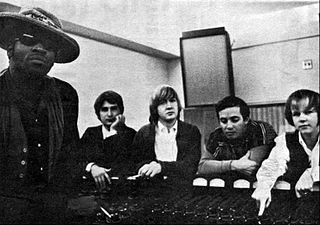
Rising Sons was an American folk-rock band formed in Los Angeles in 1965. Their initial career was short-lived, but the group found retrospective fame for launching the careers of singer Taj Mahal and guitarist Ry Cooder.

Strictly Personal is the second album by Captain Beefheart and his Magic Band. It was originally released in October 1968 as the first album on the Blue Thumb Records label. It was released nearly a year after the band had taken to the studio to record the follow-up to 1967's Safe as Milk, and was composed primarily of material intended for an aborted double-LP entitled It Comes to You in a Plain Brown Wrapper.

Shiny Beast (Bat Chain Puller) is the tenth studio album by American band Captain Beefheart and the Magic Band, released in October 1978 by Warner Bros. Records. The album emerged from production difficulties surrounding Bat Chain Puller, an album Captain Beefheart recorded for DiscReet and Virgin Records in 1976. DiscReet co-founders Herb Cohen and Frank Zappa feuded over the production of the album, because Cohen funded the production with Zappa's royalty checks. Captain Beefheart recorded a new album titled Shiny Beast (Bat Chain Puller) after Zappa withheld the master tapes of the original Bat Chain Puller album.
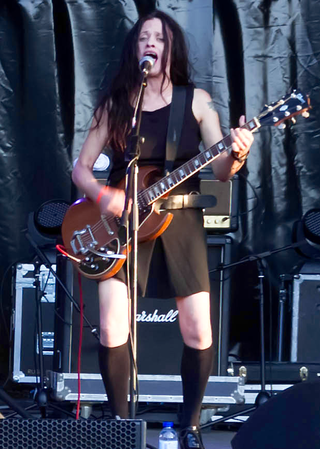
Katherine Lynne Bjelland is an American musician. She rose to prominence as the lead singer, guitarist, and songwriter of the alternative rock band Babes in Toyland, which she formed in 1987. She has been noted for her unusual vocal style alternately consisting of shrill screams, whispering, and speaking in tongues, as well as for her guitar playing style, which incorporates "jagged" tones with "psychotic rockabilly rhythms".
Black is a Bangladeshi alternative rock band formed in 1998 in Dhaka. It was originally formed by Jon Kabir, Mushfeque Jahan, and Tony Vincent (drums). They were soon joined by Mahmudul Karim Miraz, and in 2000, Tahsan Rahman Khan.
Trumans Water are an American indie rock band, hailing from San Diego, California. They have released over a dozen albums over their career, on which they collaborated with acts in genre, including Azalia Snail, Chan Marshall and Thurston Moore.
Kelly Richey is an American blues rock guitarist, singer and composer based out of Cincinnati, Ohio.

"Why Can't This Be Love" is a song by the American rock band Van Halen for their seventh studio album, 5150 (1986). The song was the group's first single with Sammy Hagar, replacing founding member David Lee Roth. It was released on both 7" and 12" formats with the latter having an extended version featuring extra lyrics.

Babe the Blue Ox (BOX) are an American, Brooklyn-based rock band. Formed in 1991, the trio was initially composed of Tim Thomas (guitar, vocals), Rose Thomson (bass, vocals) and Hanna Fox (drums, vocals). In 1995, the band contributed the song "Hazmats" to the AIDS benefit album Red Hot + Bothered produced by the Red Hot Organization. Fox's husband Eddie Gormley was formally added as 2nd drummer in 1998, and the band continues to play a handful of shows a year. In 2010, they were a headline act at the Cincinnati Mid-Point Music Festival.
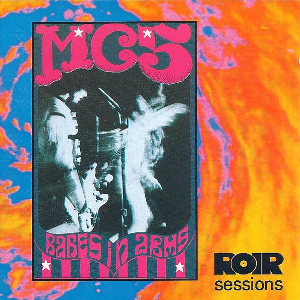
Babes in Arms is an album by the American band MC5, released in 1983. Originally released as a cassette, it has been reissued several times.

Long Hair In Three Stages is the debut studio album by the Chicago-based experimental rock quartet U.S. Maple. After recording a debut single, they recorded the album in late 1995 at the Solid Sound Studios in Illinois with producer Jim O'Rourke. It was O'Rourke's first recording session with a rock band.
"This Flight Tonight" is a song originally by Joni Mitchell, from her 1971 album Blue. Scottish hard rock band Nazareth released the song as a single in 1973 that charted internationally.

People is an album by the American band Babe the Blue Ox, released in 1996. Like the band's other releases, the album title shares a name with a Barbra Streisand record.

I Smell Smoke is an album by the American musician Michael Burks, released in 2003. It was his second album for Alligator Records. I Smell Smoke peaked at No. 12 on Billboard's Top Blues Albums chart. Burks supported it with a North American tour. I Smell Smoke was nominated for a W. C. Handy Award for best "Contemporary Blues Album".













